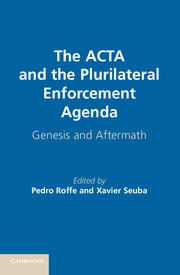Book contents
- Frontmatter
- Contents
- List of Contributors
- Foreword
- Acknowledgments
- Acronyms
- Introduction
- PART I THE FINAL ACT: ITS MAIN FEATURES AND CONTENTS
- 1 An Overview of the Agreement
- 2 ACTA Initial Provisions and General Definitions
- 3 ACTA General Obligations with Respect to Enforcement
- 4 Provisions on Civil Enforcement – Section 2 of ACTA
- 5 Legal Framework for Enforcement
- 6 ACTA and Beyond
- 7 ACTA’s Digital Chapter
- 8 The ACTA Committee
- PART II DOMESTIC LEGISLATIVE CHALLENGES
- PART III IMPACT ON RELATED PROCESSES
- PART IV VIEWS FROM STAKEHOLDERS: LESSONS
- PART V WHAT LIES AHEAD ACTA
- Annex I Anti-Counterfeiting Trade Agreement
- References
- Index
4 - Provisions on Civil Enforcement – Section 2 of ACTA
Published online by Cambridge University Press: 05 December 2014
- Frontmatter
- Contents
- List of Contributors
- Foreword
- Acknowledgments
- Acronyms
- Introduction
- PART I THE FINAL ACT: ITS MAIN FEATURES AND CONTENTS
- 1 An Overview of the Agreement
- 2 ACTA Initial Provisions and General Definitions
- 3 ACTA General Obligations with Respect to Enforcement
- 4 Provisions on Civil Enforcement – Section 2 of ACTA
- 5 Legal Framework for Enforcement
- 6 ACTA and Beyond
- 7 ACTA’s Digital Chapter
- 8 The ACTA Committee
- PART II DOMESTIC LEGISLATIVE CHALLENGES
- PART III IMPACT ON RELATED PROCESSES
- PART IV VIEWS FROM STAKEHOLDERS: LESSONS
- PART V WHAT LIES AHEAD ACTA
- Annex I Anti-Counterfeiting Trade Agreement
- References
- Index
Summary
Introduction
ACTA provisions on civil enforcement are contained in Section 2 of the agreement: Articles 7 to 12. They cover issues such as injunctions available for IP infringements, damages and other remedies, provisional measures, and information related to the infringement.
Intellectual property rights are typically privately enforceable. Civil enforcement provisions apply to all types of infringement, whether between legitimate competitors in a dispute or between a right holder and an unidentified infringer. The civil enforcement section of ACTA is obviously subject to the general enforcement obligations outlined in the treaty’s Article 6. This provision obliges the parties to provide for effective action against any infringement of intellectual property rights, including expeditious options to prevent infringements and remedies, which constitute a deterrent for further infringements.
There is also a safeguard clause in the sense that the provisions must be applied in a manner that avoids the creation of barriers to legitimate trade and provides safeguards against their abuse (this is a direct reference to the TRIPS Agreement’s safeguard provisions). Courts can treat intellectual property remedies as equitable relief, and competition authority bodies can act against IP right holders with economic positions of market dominance in relation to unilateral abusive behaviour or concerted practices in the exercise of their IPRs that harm the interests of consumers or competition as a whole. In addition, goods can be used (produced or imported) under compulsory licenses when sanctioned by government. What follows here, however, is an overview of the contents of ACTA Section 2, which deals with civil enforcement only.
- Type
- Chapter
- Information
- The ACTA and the Plurilateral Enforcement AgendaGenesis and Aftermath, pp. 80 - 87Publisher: Cambridge University PressPrint publication year: 2014



